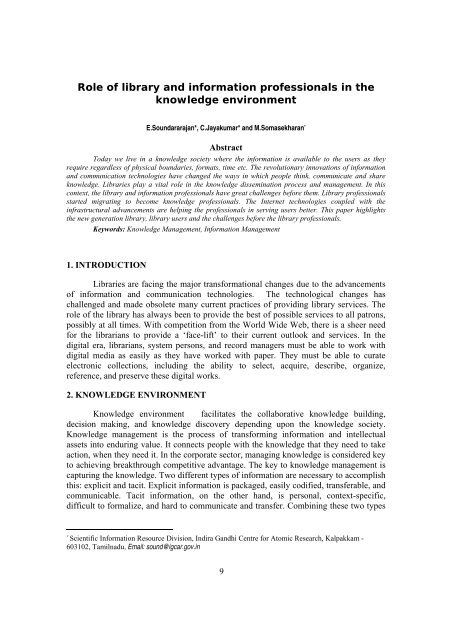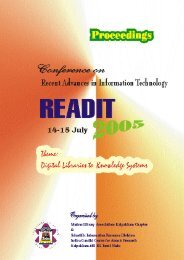READIT-2007 - Indira Gandhi Centre for Atomic Research
READIT-2007 - Indira Gandhi Centre for Atomic Research
READIT-2007 - Indira Gandhi Centre for Atomic Research
You also want an ePaper? Increase the reach of your titles
YUMPU automatically turns print PDFs into web optimized ePapers that Google loves.
Role of library and in<strong>for</strong>mation professionals in the<br />
knowledge environment<br />
E.Soundararajan*, C.Jayakumar* and M.Somasekharan *<br />
Abstract<br />
Today we live in a knowledge society where the in<strong>for</strong>mation is available to the users as they<br />
require regardless of physical boundaries, <strong>for</strong>mats, time etc. The revolutionary innovations of in<strong>for</strong>mation<br />
and communication technologies have changed the ways in which people think, communicate and share<br />
knowledge. Libraries play a vital role in the knowledge dissemination process and management. In this<br />
context, the library and in<strong>for</strong>mation professionals have great challenges be<strong>for</strong>e them. Library professionals<br />
started migrating to become knowledge professionals. The Internet technologies coupled with the<br />
infrastructural advancements are helping the professionals in serving users better. This paper highlights<br />
the new generation library, library users and the challenges be<strong>for</strong>e the library professionals.<br />
Keywords: Knowledge Management, In<strong>for</strong>mation Management<br />
1. INTRODUCTION<br />
Libraries are facing the major trans<strong>for</strong>mational changes due to the advancements<br />
of in<strong>for</strong>mation and communication technologies. The technological changes has<br />
challenged and made obsolete many current practices of providing library services. The<br />
role of the library has always been to provide the best of possible services to all patrons,<br />
possibly at all times. With competition from the World Wide Web, there is a sheer need<br />
<strong>for</strong> the librarians to provide a ‘face-lift’ to their current outlook and services. In the<br />
digital era, librarians, system persons, and record managers must be able to work with<br />
digital media as easily as they have worked with paper. They must be able to curate<br />
electronic collections, including the ability to select, acquire, describe, organize,<br />
reference, and preserve these digital works.<br />
2. KNOWLEDGE ENVIRONMENT<br />
Knowledge environment facilitates the collaborative knowledge building,<br />
decision making, and knowledge discovery depending upon the knowledge society.<br />
Knowledge management is the process of trans<strong>for</strong>ming in<strong>for</strong>mation and intellectual<br />
assets into enduring value. It connects people with the knowledge that they need to take<br />
action, when they need it. In the corporate sector, managing knowledge is considered key<br />
to achieving breakthrough competitive advantage. The key to knowledge management is<br />
capturing the knowledge. Two different types of in<strong>for</strong>mation are necessary to accomplish<br />
this: explicit and tacit. Explicit in<strong>for</strong>mation is packaged, easily codified, transferable, and<br />
communicable. Tacit in<strong>for</strong>mation, on the other hand, is personal, context-specific,<br />
difficult to <strong>for</strong>malize, and hard to communicate and transfer. Combining these two types<br />
* Scientific In<strong>for</strong>mation Resource Division, <strong>Indira</strong> <strong>Gandhi</strong> <strong>Centre</strong> <strong>for</strong> <strong>Atomic</strong> <strong>Research</strong>, Kalpakkam -<br />
603102, Tamilnadu, Email: sound@igcar.gov.in<br />
9

















